#NLRB
Text
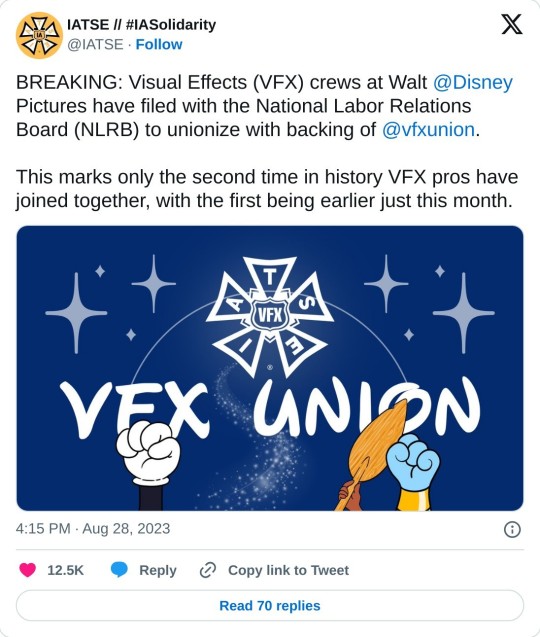


26K notes
·
View notes
Text
Companies That Union-Bust Must Now Automatically Recognize Union, NLRB Rules
The National Labor Relations Board issued a ruling on Friday that changes the framework for unionizations, making it easier for workers to organize and harder for companies to fight back against them.
The new process comes as part of a decision in the case between Cemex Construction Materials Pacific, LLC and the International Brotherhood of Teamsters, where the Board found that the employer had committed over 20 “instances of objectionable or unlawful misconduct” between the filing of the union election petition and the election itself, intending to dissuade workers from organizing.
#NLRB#national labor relations board#union#labor unions#union strong#union busting#cemex construction materials pacific#teamsters#international brotherhood of teamsters#teamsters union
3K notes
·
View notes
Text
NLRB rules that any union busting triggers automatic union recognition

Tonight (September 6) at 7pm, I'll be hosting Naomi Klein at the LA Public Library for the launch of Doppelganger.
On September 12 at 7pm, I'll be at Toronto's Another Story Bookshop with my new book The Internet Con: How to Seize the Means of Computation.

American support for unions is at its highest level in generations, from 70% (general population) to 88% (Millenials) – and yet, American unionization rates are pathetic.
That's about to change.
The National Labor Relations Board just handed down a landmark ruling – the Cemex case – that "brought worker rights back from the dead."
https://prospect.org/labor/2023-08-28-bidens-nlrb-brings-workers-rights-back/
At issue in Cemex was what the NLRB should do about employers that violate labor law during union drives. For decades, even the most flagrantly illegal union-busting was met with a wrist-slap. For example, if a boss threatened or fired an employee for participating in a union drive, the NLRB would typically issue a small fine and order the employer to re-hire the worker and provide back-pay.
Everyone knows that "a fine is a price." The NLRB's toothless response to cheating presented an easily solved equation for corrupt, union-hating bosses: if the fine amounts to less than the total, lifetime costs of paying a fair wage and offering fair labor conditions, you should cheat – hell, it's practically a fiduciary duty:
https://www.jstor.org/stable/10.1086/468061
Enter the Cemex ruling: once a majority of workers have signed a union card, any Unfair Labor Practice by their employer triggers immediate, automatic recognition of the union. In other words, the NLRB has fitted a tilt sensor in the American labor pinball machine, and if the boss tries to cheat, they automatically lose.
Cemex is a complete 180, a radical transformation of the American labor regulator from a figleaf that legitimized union busting to an actual enforcer, upholding the law that Congress passed, rather than the law that America's oligarchs wish Congress had passed. It represents a turning point in the system of lawless impunity for American plutocracy.
In the words of Frank Wilhoit, it is is a repudiation of the conservative dogma: "There must be in-groups whom the law protects but does not bind, alongside out-groups whom the law binds but does not protect":
https://crookedtimber.org/2018/03/21/liberals-against-progressives/#comment-729288
It's also a stunning example of what regulatory competence looks like. The Biden administration is a decidedly mixed bag. On the one hand there are empty suits masquerading as technocrats, champions of the party's centrist wing (slogan: "Everything is fine and change is impossible"):
https://pluralistic.net/2023/01/10/the-courage-to-govern/#whos-in-charge
But the progressive, Sanders/Warren wing of the party installed some fantastically competent, hard-charging, principled fighters, who are chapter-and-verse on their regulatory authority and have the courage to use that authority:
https://pluralistic.net/2022/10/18/administrative-competence/#i-know-stuff
They embody the old joke about the photocopier technician who charges "$1 to kick the photocopier and $79 to know where to kick it." The best Biden appointees have their boots firmly laced, and they're kicking that mother:
https://pluralistic.net/2023/08/16/the-second-best-time-is-now/#the-point-of-a-system-is-what-it-does
One such expert kicker is NLRB General Counsel Jennifer Abruzzo. Abruzzo has taken a series of muscular, bold moves to protect American workers, turning the tide in the class war that the 1% has waged on workers since the Reagan administration. For example, Abruzzo is working to turn worker misclassification – the fiction that an employee is a small business contracting with their boss, a staple of the "gig economy" – into an Unfair Labor Practice:
https://pluralistic.net/2022/01/10/see-you-in-the-funny-papers/bidens-legacy
She's also waging war on robo-scab companies: app-based employment "platforms" like Instawork that are used to recruit workers to cross picket lines, under threat of being blocked from the app and blackballed by hundreds of local employers:
https://pluralistic.net/2023/07/30/computer-says-scab/#instawork
With Cemex, Abruzzo is restoring a century-old labor principle that has been gathering dust for generations: the idea that workers have the right to organize workplace gemocracies without fear of retaliation, harassment, or reprisals.
But as Harold Meyerson writes for The American Prospect, the Cemex ruling has its limits. Even if the NLRB forces and employer to recognize a union, they can't force the employer to bargain in good faith for a union contract. The National Labor Relations Act prohibits the Board from imposing a contract.
That's created a loophole that corrupt bosses have driven entire fleets of trucks through. Workers who attain union recognition face years-long struggles to win a contract, as their bosses walk away from negotiations or offer farcical "bargaining positions" in the expectation that they'll be rejected, prolonging the delay.
Democrats have been trying to fix this loophole since the LBJ years, but they've been repeatedly blocked in the senate. But Abruzzo is a consummate photocopier kicker, and she's taking aim. In Thrive Pet Healthcare, Abruzzo has argued that failing to bargain in good faith for a contract is itself an Unfair Labor Practice. That means the NLRB has the authority to act to correct it – they can't order a contract, but they can order the employer to give workers "wages, benefits, hours, and such that are comparable to those provided by comparable unionized companies in their field."
Mitch McConnell is a piece of shit, but he's no slouch at kicking photocopiers himself. For a whole year, McConnell has blocked senate confirmation hearings to fill a vacant seat on the NLRB. In the short term, this meant that the three Dems on the board were able to hand down these bold rulings without worrying about their GOP colleagues.
But McConnell was playing a long game. Board member Gwynne Wilcox's term is about to expire. If her seat remains vacant, the three remaining board members won't be able to form a quorum, and the NLRB won't be able to do anything.
As Meyerson writes, centrist Dems have refused to push McConnell on this, hoping for comity and not wanting to violate decorum. But Chuck Schumer has finally bestirred himself to fight this issue, and Alaska GOP senator Lisa Murkowski has already broken with her party to move Wilcox's confirmation to a floor vote.
The work of enforcers like DoJ Antitrust Division boss Jonathan Kanter, FTC chair Lina Khan, and SEC chair Gary Gensler is at the heart of Bidenomics: the muscular, fearless deployment of existing regulatory authority to make life better for everyday Americans.
But of course, "existing regulatory authority" isn't the last word. The judges filling stolen seats on the illegitimate Supreme Court had invented the "major questions doctrine" and have used it as a club to attack Biden's photocopier-kickers. There's real danger that Cemex – and other key actions – will get fast-tracked to SCOTUS so the dotards in robes can shatter our dreams for a better America.
Meyerson is cautiously optimistic here. At 40% (!), the Court's approval rating is at a low not seen since the New Deal showdowns. The Supremes don't have an army, they don't have cops, they just have legitimacy. If Americans refuse to acknowledge their decisions, all they can do it sit and stew:
https://pluralistic.net/2023/05/26/mint-the-coin-etc-etc/#blitz-em
The Court knows this. That's why they fume so publicly about attacks on their legitimacy. Without legitimacy, they're nothing. With the Supremes' support at 40% and union support at 70%, any judicial attack on Cemex could trigger term-limits, court-packing, and other doomsday scenarios that will haunt the relatively young judges for decades, as the seats they stole dwindle into irrelevance. Meyerson predicts that this will weigh on them, and may stay their hands.
Meyerson might be wrong, of course. No one ever lost money betting on the self-destructive hubris of Federalist Society judges. But even if he's wrong, his point is important. If the Supremes frustrate the democratic will of the American people, we have to smash the Supremes. Term limits, court-packing, whatever it takes:
https://pluralistic.net/2020/09/20/judicial-equilibria/#pack-the-court
And the more we talk about this – the more we make this consequence explicit – the more it will weigh on them, and the better the chance that they'll surprise us. That's already happening! The Supremes just crushed the Sackler opioid crime-family's dream of keeping their billions in blood-money:
https://pluralistic.net/2023/08/11/justice-delayed/#justice-redeemed
But if it doesn't stop them? If they crush this dream, too? Pack the court. Impose term limits. Make it the issue. Don't apologize, don't shrug it off, don't succumb to learned helplessness. Make it our demand. Make it a litmus test: "If elected, will you vote to pack the court and clear the way for democratic legitimacy?"
Meanwhile, Cemex is already bearing fruit. After an NYC Trader Joe's violated the law to keep Trader Joe's United from organizing a store, the workers there have petitioned to have their union automatically recognized under the Cemex rule:
https://truthout.org/articles/trader-joes-union-files-to-force-company-to-recognize-union-under-new-nlrb-rule/
With the NLRB clearing the regulatory obstacles to union recognition, America's largest unions are awakening from their own long slumbers. For decades, unions have spent a desultory 3% of their budgets on organizing workers into new locals. But a leadership upset in the AFL-CIO has unions ready to catch a wave with the young workers and their 88% approval rating, with a massive planned organizing drive:
https://prospect.org/labor/labors-john-l-lewis-moment/
Meyerson calls on other large unions to follow suit, and the unions seem ready to do so, with new leaders and new militancy at the Teamsters and UAW, and with SEIU members at unionized Starbucks waiting for their first contracts.
Turning union-supporting workers into unionized workers is key to fighting Supreme Court sabotage. Organized labor will give fighters like Abruzzo the political cover she needs to Get Shit Done. A better America is possible. It's within our grasp. Though there is a long way to go, we are winning crucial victories all the time.
The centrist message that everything is fine and change is impossible is designed to demoralize you, to win the fight in your mind so they don't have to win it in the streets and in the jobsite. We don't have to give them that victory. It's ours for the taking.

If you'd like an essay-formatted version of this post to read or share, here's a link to it on pluralistic.net, my surveillance-free, ad-free, tracker-free blog:
https://pluralistic.net/2023/09/06/goons-ginks-and-company-finks


#nlrb#cemex#unions#labor#class war#photocopier kickers#ulp#unfair labor practices#jennifer abruzzo#thrive pet care#national labor review board#scotus#afl-cio#trader joes#harold meyerson#labor day#pluralistic
3K notes
·
View notes
Text
Version that doesn't require sign-in.
"Hot Labor Summer just became a scorcher.
[On August 25, 2023], the National Labor Relations Board released its most important ruling in many decades. In a party-line decision in Cemex Construction Materials Pacific, LLC, the Board ruled that when a majority of a company’s employees file union affiliation cards, the employer can either voluntarily recognize their union or, if not, ask the Board to run a union recognition election. If, in the run-up to or during that election, the employer commits an unfair labor practice, such as illegally firing pro-union workers (which has become routine in nearly every such election over the past 40 years, as the penalties have been negligible), the Board will order the employer to recognize the union and enter forthwith [a.k.a. immediately] into bargaining.
The Cemex decision was preceded by another, one day earlier, in which the Board, also along party lines, set out rules for representation elections which required them to be held promptly after the Board had been asked to conduct them, curtailing employers’ ability to delay them, often indefinitely.
Taken together, this one-two punch effectively makes union organizing possible again, after decades in which unpunished employer illegality was the most decisive factor in reducing the nation’s rate of private-sector unionization from roughly 35 percent to the bare 6 percent at which it stands today...
“This is a sea change, a home run for workers,” said Brian Petruska, an attorney for the Laborers Union who authored a 2017 law review article on how to effectively restore to workers their right to collective bargaining enshrined in the 1935 National Labor Relations Act, which was all but nullified by the act’s weakening over the past half-century. Taken together, Petruska added, last week’s decisions recreate “a system with no tolerance for employers’ coercion of their employees” when their employees seek their legal right to collective bargaining...
Since the days of Lyndon Johnson, every time that the Democrats have controlled the White House and both houses of Congress, they’ve tried to put some teeth back into the steadily more toothless NLRA. But they’ve never managed to muster the 60 votes needed to get those measures through the Senate. The Cemex ruling actually goes beyond much of what was proposed in those never-enacted bills."
-via The American Prospect, August 28, 2023
--
Note: I didn't include it because the paragraphs about it went super into the weeds, but the reason all of this is happening is because of the NRLB's general counsel, Jennifer Abruzzo, who was appointed by Biden. In fact, according to this article, this "secures Abruzzo’s place as the most important public official to secure American workers’ rights since New York Sen. Robert Wagner, who authored the NLRA in 1935." Voting matters
#labor#labor rights#labor unions#workers rights#unions#unionize#nlrb#national labor relations board#biden#biden administration#united states#us politics#voting matters#american politics#organized labor#union busting#good news#hope#hope posting#hot labor summer#pro union
1K notes
·
View notes
Text
In the latest sign of a growing backlash within corporate America to the 88-year-old federal agency that enforces labor rights, Amazon argued in a legal filing on Thursday that the National Labor Relations Board was unconstitutional.
The move followed a similar argument by SpaceX, the rocket company founded and run by Elon Musk, in a legal complaint in January, and by Trader Joe’s during a labor board hearing a few weeks later.
The labor board consists of a prosecutorial arm, which issues complaints against employers or unions deemed to have violated federally protected labor rights; administrative judges, who hear complaints; and a five-member board in Washington, to which decisions can be appealed.
Amazon’s filing was part of a case before an administrative judge in which labor board prosecutors have accused Amazon of illegally retaliating against workers at a Staten Island warehouse known as JFK8, which unionized two years ago.
368 notes
·
View notes
Text
Unions Can Still Strike—Don't Let the Supreme Court Tell You Otherwise

The U.S. Supreme Court’s decision in Glacier Northwest v. Teamsters Local 174 is outrageous—valuing property over workers’ rights. But it could have been much worse.
Unions still have the right to strike. Employers still can’t generally sue unions in state court for losses caused by strikes. But the decision does open the door to whittling away those rights more in the future. [Emphasis added.]
The practical impact of the Court’s decision is that employers will be suing unions more often for alleged property damage caused by strikes—and that therefore unions (and their attorneys) are likely to be more cautious.
But the Court did not do what many had feared it would do in this case: overrule longstanding precedent that employers generally cannot sue unions in state court over activities—like strikes—covered by the National Labor Relations Act.
Read more from the article:
553 notes
·
View notes
Text
🗣️ Please pay attention
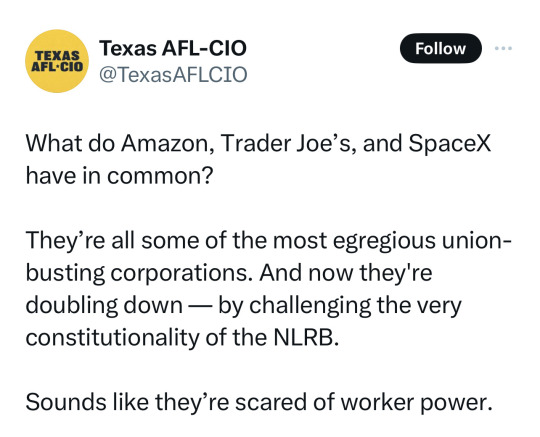

Amazon argues that national labor board is unconstitutional, joining SpaceX and Trader Joe’s
Amazon is arguing in a legal filing that the 88-year-old National Labor Relations Board is unconstitutional, echoing similar arguments made this year by Elon Musk’s SpaceX and the grocery store chain Trader Joe’s in disputes about workers’ rights and organizing.
The Amazon filing, made Thursday, came in response to a case before an administrative law judge overseeing a complaint from agency prosecutors who allege the company unlawfully retaliated against workers at a New York City warehouse who voted to unionize nearly two years ago.
In its filing, Amazon denies many of the charges and asks for the complaint to be dismissed. The company’s attorneys then go further, arguing that the structure of the agency — particularly limits on the removal of administrative law judges and five board members appointed by the president — violates the separation of powers and infringes on executive powers stipulated in the Constitution.
The attorneys also argue that NLRB proceedings deny the company a trial by a jury and violate its due-process rights under the Fifth Amendment. (source)
ICYMI, this is a case of corporations going, “7th Amendment Protections for me, but not for thee.”
It is strongly worth noting that in 2018 the John Roberts Court ruled 5-4 that companies can use forced arbitration clauses to stop people from joining together to fight workplace abuses - in effect denying individuals their 7th Amendment protections.
Subsequently, binding arbitration clauses used by corporations has proliferated; sneaking into all manner of common legal documents: personal banking applications, ordinary car loan applications, furniture purchases, and more. This is, unsurprisingly, a direct violation of the 7th Amendment that guarantees HUMAN BEINGS AND PEOPLE the right to a jury trial in certain civil cases and inhibits courts from overturning a jury's findings of fact. Republicans and SCOTUS are perfectly okay with corporations having more rights than workers and using forced arbitration to block people from having access to jury trials—but God forbid if corporations don’t have their right to a jury trial.
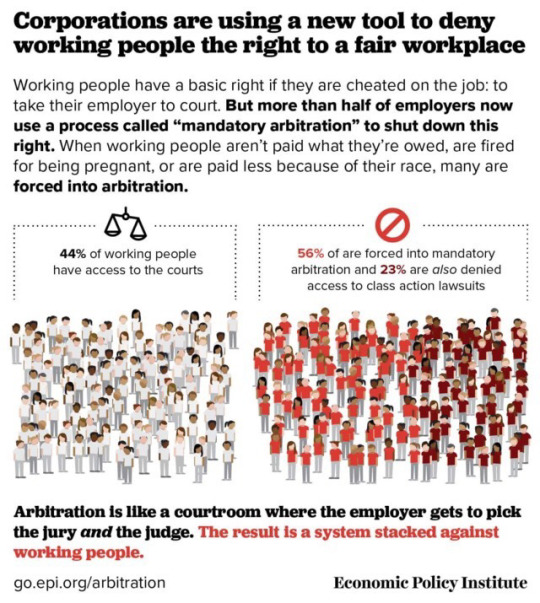
This legislative push to bestow corporations with more rights than people, while simultaneously taking away rights from human beings, has been nothing if not thoroughly and methodically done. At this rate, no corporation will ever need to fear a class action lawsuit again.
Amazon, SpaceX and Trader Joe’s are union busting.
But this latest case against the NLRB isn’t just an attack on labor and worker’s rights, it’s a fascistic attack on the very heart of fairness and democracy itself.
#politics#amazon#7th amendment#forced arbitration#spacex#trader joes#nlrb#workers rights#class action lawsuits#labor unions#union busting#collective bargaining#labor law#labor rights#scotus#john roberts court#john roberts#republicans are evil
100 notes
·
View notes
Text
Andrea Hsu at NPR:
Hours before their final game of the season, the Dartmouth men's basketball team has voted to join a union, becoming the first unionized college sports team in the U.S. and opening many thorny questions about the future of college sports.
Led by Dartmouth forward Cade Haskins and guard Romeo Myrthil, the 15 players announced their intent to unionize last September, arguing that the business of college sports is different that it was a few years ago. Tuesday's vote was 13 to 2 in favor of joining SEIU Local 560.
"Today is a big day for our team. We stuck together all season and won this election," wrote Haskins and Myrthil in a statement. "Let's work together to create a less exploitative business model for college sports."
The election was held over the objections of the Trustees of Dartmouth College, which last week filed a motion asking the National Labor Relations Board to halt the election pending further review. The NLRB denied that request.
On Tuesday, Dartmouth asked the NLRB to overturn the decision by the agency's regional director to hold the election in the first place, setting the stage for a protracted legal fight.
Are college athletes employees?
At the heart of this election was the issue of whether college athletes should be considered employees and therefore have to the right under federal labor law to form unions and collectively bargain over pay and benefits.
In the student newspaper, Haskins and Myrthil said they believe they should be compensated the same as other student employees. Being paid for the time they spend on the sport "would alleviate the need for second jobs and enhance our experience as part of the Dartmouth community," they wrote.
A union would also allow them to negotiate better health care benefits, to cover out-of-pocket costs incurred as a result of injuries sustained while playing for the school, the players argued.
In a ruling last month, NLRB regional director Laura Sacks concluded that an employer-employee relationship does exist between the Dartmouth basketball players and the college. She found that the players perform work that benefits their school through things like alumni donations and publicity, that the players are compensated for that work in nonmonetary ways, and that Dartmouth exercises a lot of control over that work. Her ruling paved the way for Tuesday's election.
Dartmouth College's men's basketball team is the first college basketball team to be unionized, as they voted to join SEIU Local 560.
See Also:
Daily Kos: Dartmouth men's basketball team makes history by becoming first US college sports team to unionize
#Unionization#Unions#NLRB#College Sports#College Basketball#Men's College Basketball#SEIU Local 560#SEIU#Dartmouth College#Dartmouth Big Green#Labor#Workers' Rights
44 notes
·
View notes
Text
Conor here: The following post goes into the ins and outs of the case ahead of the April 23 beginning of the case, the outcome of which seems to be a foregone conclusion and will be a major blow to labor.>New York Times labor reporter Noam Scheiber noted back in January when the Supremes agreed to hear the case that the very fact that they did so meant they would likely rule so that it’s harder to unionize. The reasoning behind that belief isn’t just the conservative majority on the court but also that the courtdeclined to hear a similar case in 2014 (back before the current conservative majority).
By Michael Z. Green, professor of law and the director of the Workplace Law Program at Texas A&M University. Originally published at The Conversation.
What factors must a court consider when the National Labor Relations Board requests an order requiring an employer to rehire terminated workers before the completion of unfair labor practice proceedings?
That’s the central question that the Supreme Court will consider on April 23, 2024, during oral arguments in the Starbucks Corp. v. McKinney case. The global coffee shop chain is challenging the NLRB, the federal agency responsible for enforcing U.S. workers’ rights to organize, saying that the agency used the more labor-friendly of two available standards when it asked a federal court to order the company to reinstate workers at a Memphis, Tennessee, store who lost their jobs in 2022 amid a nationwide unionizing campaign.
The Conversation U.S. asked Texas A&M law professor Michael Z. Green to explain what’s behind this case and how the court’s eventual decision, expected by the end of June, could affect the right to organize unions in the United States.
What Is This Case About?
Seven baristas who were attempting to organize a union at a Starbucks shop in Memphis, Tennessee, were fired in February 2022. Starbucks justified their dismissal by asserting that the employees, sometimes called the “Memphis 7,” had broken company rules by reopening their store after closing time and inviting people who weren’t employees, including a television crew, to go inside.
In June of that year, the shop became one of more than 400 Starbucks locations since 2021 that have voted in favor of joining Workers United, an affiliate of the Service Employees International Union.
While a complaint over the mass dismissal was pending with the NLRB, Kathleen McKinney, the NLRB director for the region that includes Memphis, sought an injunction in a federal district court to force Starbucks to give the Memphis 7 their jobs back while the case proceeded. The company must “cease its unlawful conduct immediately so that all Starbucks workers can fully and freely exercise their labor rights,” she said.
By August 2022, a judge had ordered Starbucks to do that, and in September the baristas were back on staff.
Although the seven baristas got their jobs back and the union vote prevailed, the company has appealed the case all the way to the Supreme Court because it believes the court should not have ordered the company to reinstate the workers while NLRB proceedings were still pending.
But the NLRB argues, and the lower courts agreed, that the terminations chilled further union activities at the store even after the election.
Nevertheless, Starbucks argues that firing the seven workers had no effect because employees at that coffeehouse still voted in favor of unionization.
What’s Being Challenged?
The justices will have to decide which approach federal courts should use when they consider requests for injunctions like this one.
Currently, five appeals courts, including the one where this case arose, base their decision on a two-part test.
First, the courts determine whether there is “reasonable cause” to believe an unfair labor practice has occurred. Second, they determine whether granting an injunction would be “just and proper.”
Four other appeals courts use a four-part test.
First, the courts ask whether the unfair labor practice case is likely to succeed on the merits in establishing that labor violations occurred. Second, they look to see if the workers the NLRB is attempting to protect will face irreparable harm without an injunction. Third, after showing likelihood of success and irreparable harm, they ask whether those factors outweigh any hardships the employer is likely to face due to compliance with the court’s order. Fourth, they ask whether issuing the injunction serves the public interest.
Two other appeals courts use a hybrid test that appears to have components of both of the tests. They ask whether issuing an injunction would be “just and proper” by considering the elements of the four-part test.
In its Supreme Court brief, Starbucks argues that having to give workers their jobs back in these circumstances can cause “irreparable injury” and that it’s an “extraordinary remedy.”
The NLRB, in its Supreme Court brief, says that the injunction was proper in this case because Starbucks terminated 80% of the union organizing committee at the Memphis store and the evidence showed the chilling effect this action had on the “lone remaining union activist.” According to the NLRB, this chilling effect “harmed the union campaign in ways that a subsequent Board ruling could not repair.”
A labor reporter discussing Starbucks’ unfair labor practice cases, including the one involving the Memphis 7, determined that NLRB administrative law judges had found labor violations in 48 out of 49 cases.
What’s the Potential Impact of the Court’s Eventual Ruling on This Case?
While the case may sound like it’s only about seven people employed at a single coffee shop, the scope is wider than that.
Although the NLRB issues hundreds of unfair labor practice complaints against employers every year, it usually doesn’t turn to the courts to force the rehiring of employees. It only sought these types of injunctions 17 times in 2023, for example.
And seven of those efforts involved Starbucks. Despite the small number of overall injunctions, the large number of unfair labor practice complaints – and the eventual 48 out of 49 findings of violations – might support the rare use of injunctions in this case.
If the Supreme Court rules in favor of Starbucks, the overall impact seems unclear.
For one thing, the court will have picked one test over another without any proof that one is more likely to result in an injunction or not. In addition, the underlying unfair labor practice case has been resolved, since the workers have gotten their jobs back and their workplace has joined a union.
What’s more, Starbucks has agreed to negotiate a collective bargaining agreement with the union – which has continued to make inroads at the company’s coffee shops.
Because the NLRB rarely seeks injunctions, the fact that this issue has obtained enough importance for consideration by the Supreme Court seems odd considering its valuable time and the limited number of cases it can consider each year. But let’s see what the court’s majority decides.
19 notes
·
View notes
Text
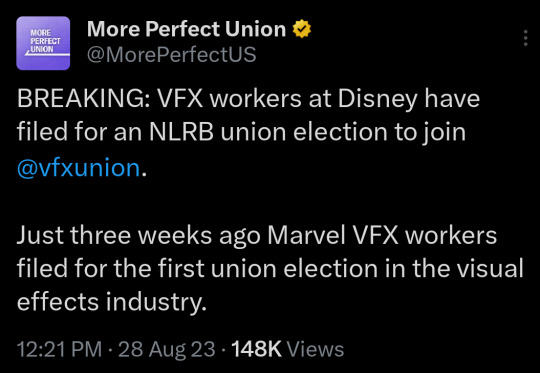
Source
Love this momentum

62 notes
·
View notes
Text
Meanwhile, over at Twitter...
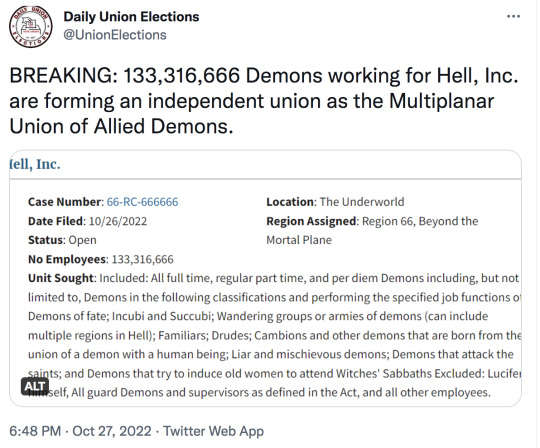
ALT: Pictured is a filing from the National Labor Relations Board website showing a petition for certification of a labor organization as the representative of a collective bargaining unit. The Employer is Hell, Inc. located in The Underworld. There are 133,316,666 employees in the proposed bargaining unit made up of All full time, regular part time, and per diem Demons including, but not limited to, Demons in the following classifications and performing the specified job functions of: Demons of fate; Incubi and Succubi; Wandering groups or armies of demons (can include multiple regions in Hell); Familiars; Drudes; Cambions and other demons that are born from the union of a demon with a human being; Liar and mischievous demons; Demons that attack the saints; and Demons that try to induce old women to attend Witches' Sabbaths. Excluded: Lucifer himself, all guard Demons and supervisors as defined in the Act, and all other employees.
188 notes
·
View notes
Text
By Josh Eidelson
January 26, 2024 at 9:49 PM UTC
Trader Joe’s Follows SpaceX in Arguing US Labor Board Is Unconstitutional
Grocery chain Trader Joe’s is joining Elon Musk’s SpaceX in arguing that the US labor board, which is prosecuting cases against both companies, is unconstitutional.
“The structure and organization of the National Labor Relations Board and the agency’s administrative law judges is unconstitutional,” an attorney for Trader Joe’s said at a Jan. 16 NLRB hearing, according to a transcript Bloomberg News obtained through a Freedom of Information Act request.
19 notes
·
View notes
Text
youtube
Billionaires are pillaging America. How do we fight back? | The Chris Hedges Report
The resurgence of the labor movement in 2023 galvanized and emboldened unions around the country—and sent capitalists scrambling to squash the nascent militancy of their workers. Among the attempts of the billionaire class to retaliate is a major legal challenge to the National Labor Relations Board, the government body that has protected the right of workers to collective bargaining for 89 years. This latest attack on the rights of workers is the culmination of a decades-long assault on the working class in the US, which has been caught between an economic system hemorrhaging jobs and a political system that refuses to address their problems. Les Leopold, executive director of the Labor Institute and author of Wall Street's War on Workers, joins The Chris Hedges Report to discuss the full-spectrum assault on worker power taking place before our eyes.
#capitalism#crisis of legitimacy#billionaires#class war#unions#Amazon#starbucks#trader joes#nlrb#plutocracy#corporate state#Youtube#democrats#republicans#neoliberalism#deregulation#oligarchy#chris hedges
12 notes
·
View notes
Text
Housing is a labor issue
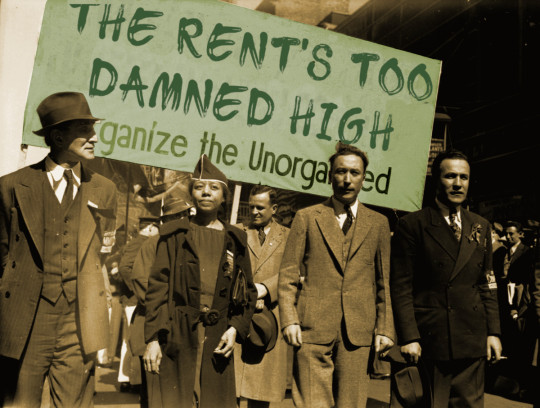
There's a reason Reagan declared war on unions before he declared war on everything else – environmental protection, health care, consumer rights, financial regulation. Unions are how working people fight for a better world for all of us. They're how everyday people come together to resist oligarchy, extraction and exploitation.
Take the 2019 LA teachers' strike. As Jane McAlevey writes in A Collective Bargain, the LA teachers didn't just win higher pay for their members! They also demanded (and got) an end to immigration sweeps of parents waiting for their kids at the school gate; a guarantee of green space near every public school in the city; and on-site immigration counselors in LA schools:
https://pluralistic.net/2023/04/23/a-collective-bargain/
Unionization is enjoying an historic renaissance. The Hot Labor Summer transitioned to an Eternal Labor September, and it's still going strong, with UAW president Shawn Fain celebrating his members victory over the Big Three automakers by calling for a 2028 general strike:
https://www.teenvogue.com/story/uaw-general-strike-no-class
The rising labor movement has powerful allies in the Biden Administration. NLRB general counsel Jennifer Abruzzo is systematically gutting the "union avoidance" playbook. She's banned the use of temp-work app blacklists that force workers to cross picket lines:
https://pluralistic.net/2023/07/30/computer-says-scab/#instawork
She's changed the penalty for bosses who violate labor law during union drives. It used to be the boss would pay a fine, which was an easy price to pay in exchange for killing your workers' union. Now, the penalty is automatic recognition of the union:
https://pluralistic.net/2023/09/06/goons-ginks-and-company-finks/#if-blood-be-the-price-of-your-cursed-wealth
And while the law doesn't allow Abruzzo to impose a contract on companies that refuse to bargain their unions, she's set to force those companies to honor other employers' union contracts until they agree to a contract with their own workers:
https://onlabor.org/gc-abruzzo-just-asked-the-nlrb-to-overturn-ex-cell-o-heres-why-that-matters/
She's also nuking TRAPs, the deals that force workers to repay their employers for their "training expenses" if they have the audacity to quit and get a better job somewhere else:
https://pluralistic.net/2023/09/14/prop-22-never-again/#norms-code-laws-markets
(As with every aspect of the Biden White House, its labor policy is contradictory and self-defeating, with other Biden appointees working to smash worker power, including when Biden broke the railworkers' strike:)
https://pluralistic.net/2023/09/18/co-determination/#now-make-me-do-it
A surging labor movement opens up all kinds of possibilities for a better world. Writing for the Law and Political Economy Project, UNITE Here attorney Zoe Tucker makes the case for unions as a way out of America's brutal housing crisis:
https://lpeproject.org/blog/why-unions-should-join-the-housing-fight/
She describes how low-waged LA hotel workers have been pushed out of neighborhoods close to their jobs, with UNITE Here members commuting three hours in each direction, starting their work-days at 3AM in order to clock in on time:
https://twitter.com/MorePerfectUS/status/1669088899769987079
UNITE Here members are striking against 50 hotels in LA and Orange County, and their demands include significant cost-of-living raises. But more money won't give them back the time they give up to those bruising daily commutes. For that, unions need to make housing itself a demand.
As Tucker writes, most workers are tenants and vice-versa. What's more, bad landlords are apt to be bad bosses, too. Stepan Kazaryan, the same guy who owns the strip club whose conditions were so bad that it prompted the creation of Equity Strippers NoHo, the first strippers' union in a generation, is also a shitty landlord whose tenants went on a rent-strike:
https://pluralistic.net/2023/05/20/the-missing-links/#plunderphonics
So it was only natural that Kazaryan's tenants walked the picket line with the Equity Stripper Noho workers:
https://twitter.com/glendaletenants/status/1733290276599570736?s=46
While scumbag bosses/evil landlords like Kazaryan deal out misery retail, one apartment building at a time, the wholesale destruction of workers' lives comes from private equity giants who are the most prolific source of TRAPs, robo-scabbing apps, illegal union busting, and indefinite contract delays – and these are the very same PE firms that are buying up millions of single-family homes and turning them into slums:
https://pluralistic.net/2022/02/08/wall-street-landlords/#the-new-slumlords
Tucker's point is that when a worker clocks out of their bad job, commutes home for three hours, and gets back to their black-mold-saturated, overpriced apartment to find a notice of a new junk fee (like a surcharge for paying your rent in cash, by check, or by direct payment), they're fighting the very same corporations.
Unions who defend their workers' right to shelter do every tenant a service. A coalition of LA unions succeeded in passing Measure ULA, which uses a surcharge on real estate transactions over $5m to fund "the largest municipal housing program in the country":
https://unitedtohousela.com/app/uploads/2022/05/LA_City_Affordable_Housing_Petition_H.pdf
LA unions are fighting for rules to limit Airbnbs and other platforms that transform the city's rental stock into illegal, unlicensed hotels:
https://upgo.lab.mcgill.ca/publication/strs-in-los-angeles-2022/Wachsmuth_LA_2022.pdf
And the hotel workers organized under UNITE Here are fighting their own employers: the hoteliers who are aggressively buying up residences, evicting their long-term tenants, tearing down the building and putting up a luxury hotel. They got LA council to pass a law requiring hotels to build new housing to replace any residences they displace:
https://www.latimes.com/california/story/2023-11-28/airbnb-operators-would-need-police-permit-in-l-a-under-proposed-law
UNITE Here is bargaining for a per-room hotel surcharge to fund housing specifically for hotel workers, so the people who change the sheets and clean the toilets don't have to waste six hours a day commuting to do so.
Labor unions and tenant unions have a long history of collaboration in the USA. NYC's first housing coop was midwifed by the Amalgamated Clothing Workers of America in 1927. The Penn South coop was created by the International Ladies Garment Workers’ Union. The 1949 Federal Housing Act passed after American unions pushed hard for it:
http://www.peterdreier.com/wp-content/uploads/2014/07/Labors-Love-Lost.pdf
It goes both ways. Strong unions can create sound housing – and precarious housing makes unions weaker. Remember during the Hollywood writers' strike, when an anonymous studio ghoul told the press the plans was to "allow things to drag on until union members start losing their apartments and losing their houses?"
Vienna has the most successful housing in any major city in the world. It's the city where people of every income and background live in comfort without being rent-burdened and without worry about eviction, mold, or leaks. That's the legacy of Red Vienna, the Austrian period of Social Democratic Workers' Party rule and built vast tracts of high-quality public housing. The system was so robust that it rebounded after World War II and continues to this day:
https://www.politico.eu/article/vienna-social-housing-architecture-austria-stigma/
Today, the rest of the world is mired in a terrible housing crisis. It's not merely that the rent's too damned high (though it is) – housing precarity is driving dangerous political instability:
https://pluralistic.net/2021/06/06/the-rents-too-damned-high/
Turning the human necessity of shelter into a market commodity is a failure. The economic orthodoxy that insists that public housing, rent control, and high-density zoning will lead to less housing has failed. rent control works:
https://pluralistic.net/2023/05/16/mortgages-are-rent-control/#housing-is-a-human-right-not-an-asset
Leaving housing to the market only produces losers. If you have the bad luck to invest everything you have into a home in a city that contracts, you're wiped out. If you have the bad luck into invest everything into a home in a "superstar city" where prices go up, you also lose, because your city becomes uninhabitable and your children can't afford to live there:
https://pluralistic.net/2021/09/27/lethal-dysfunction/#yimby
A strong labor movement is the best chance we have for breaking the housing deadlock. And housing is just for starters. Labor is the key to opening every frozen-in-place dysfunction. Take care work: the aging, increasingly chronically ill American population is being tortured and murdered by private equity hospices, long-term care facilities and health services that have been rolled up by the same private equity firms that destroyed work and housing:
https://pluralistic.net/2023/04/26/death-panels/#what-the-heck-is-going-on-with-CMS
In her interview with Capital & Main's Jessica Goodheart, National Domestic Workers Alliance president Ai-jen Poo describes how making things better for care workers will make things better for everyone:
https://prospect.org/labor/2023-12-13-labor-leader-ai-jen-poo-interview/
Care work is a "triple dignity investment": first, it makes life better for the worker (most often a woman of color), then, it allows family members of people who need care to move into higher paid work; and of course, it makes life better for people who need care: "It delivers human potential and agency. It delivers a future workforce. It delivers quality of life."
The failure to fund care work is a massive driver of inequality. America's sole federal public provision for care is Medicaid, which only kicks in after a family it totally impoverished. Funding care with tax increases polls high with both Democrats and Republicans, making it good politics:
https://www.dataforprogress.org/blog/2021/4/7/voters-support-investing-in-the-care-economy
Congress stripped many of the care provisions from Build Back Better, missing a chance for an "unprecedented, transformational investment in care." But the administrative agencies picked up where Congress failed, following a detailed executive order that identifies existing, previously unused powers to improve care in America. The EO "expands access to care, supports family caregivers and improves wages and conditions for the workforce":
https://www.whitehouse.gov/briefing-room/presidential-actions/2023/04/18/executive-order-on-increasing-access-to-high-quality-care-and-supporting-caregivers/
States are also filling the void. Washington just created a long-term care benefit:
https://apnews.com/article/washington-long-term-care-tax-disability-cb54b04b025223dbdba7199db1d254e4
New Mexicans passed a ballot initiative that establishes permanent funding for child care:
https://www.cwla.org/new-mexico-votes-for-child-care/
New York care workers won a $3/hour across the board raise:
https://inequality.org/great-divide/new-york-budget-fair-pay-home-care/
The fight is being led by women of color, and they're kicking ass – and they're doing it through their unions. Worker power is the foundation that we build a better world upon, and it's surging.

If you'd like an essay-formatted version of this post to read or share, here's a link to it on pluralistic.net, my surveillance-free, ad-free, tracker-free blog:
https://pluralistic.net/2023/12/13/i-want-a-roof-over-my-head/#and-bread-on-the-table
#pluralistic#labor#hot labor summer#eternal labor september#jane mcalevey#los angeles#weaponized shelter#housing#airbnb#equity strip noho#tenants unions#red vienna#jennifer abruzzo#nlrb#the rent's too damned high
1K notes
·
View notes
Text
Mass firings, wage cuts and open hostility: workers are burnt out but still unionizing
158 notes
·
View notes
Text
A federal labor judge ruled Thursday that Starbucks broke the law by providing raises and additional benefits for non-union workers last year without offering those same increases to unionized staff.
The ruling, first reported by Bloomberg, is a decision on the latest in a trend of allegations that Starbucks went through with a vast union-busting campaign in 2021 and 2022 as its shops increasingly considered joining an upstart barista union.
Specifically, the judge ruled that the company violated the National Labor Relations Act last August by giving non-union workers a raise to at least $15 an hour, but did not extend the raises to unionized staff.
#news#nlrb#national labor relations board#starbucks union#union strong#hot labor summer#hot labor fall#barista union#baristas
461 notes
·
View notes